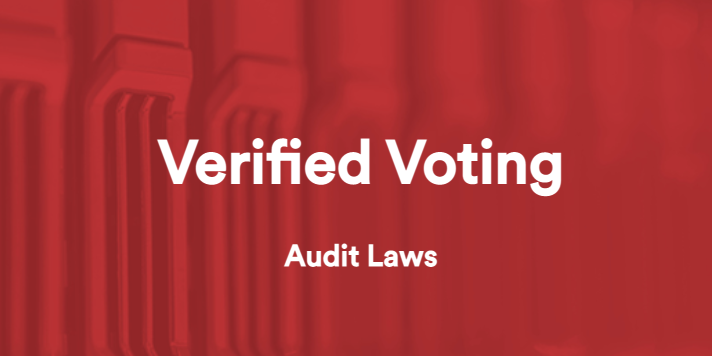State Summary
Senate Bill 413, signed into law on May 5, 2017, first authorized the state election board to conduct risk-limiting audits in Rhode Island beginning in 2018. The state election board is authorized to conduct risk-limiting audits after primary, general, and special elections; risk-limiting audits are required after the presidential preference primary and general elections. Initially, risk-limiting audits were limited to statewide contests, but a change to statute in 2024 allowed general assembly elections to be subject to risk-limiting audits. As defined in statute: “A risk-limiting audit shall begin with a hand tally of the votes in one or more audit units and shall continue to hand tally votes in additional audit units until there is strong statistical evidence that the electoral outcome is correct.” 17 R.I. Gen. Laws § 17-19-37.4 (e)(3). The state election board first adopted regulations for the risk-limiting audit in 2024. 410-RICR-20-00-28.
Unless otherwise specified, statutory references are to 17 R.I. Gen. Laws § 17-19-37.4.
Voting Systems Used
Rhode Island uses hand-marked paper ballots and optical scanners in polling places statewide, with ballot marking devices for accessibility. For the most up to date information please visit Verified Voting’s Verifier.
For an explanation on the types of voting equipment used please, here.
Audit Comprehensiveness
The statute is silent on which ballots to include in the audit, but in practice Rhode Island has incorporated all ballot types. (By definition, a risk-limiting audit requires that all ballots are considered in determining whether the risk limit has been met.) 410-RICR-20-00-28.2(D) specifies that the ballot manifest prepared for the audit must include all ballot cards counted in the election, irrespective of ballot type.
Transparency
“The board in conjunction with the local boards shall conduct the audit in public view.” 7 R.I. Gen. Laws § 17-19-37.4(c)(5). The audit rule provides additional details on which aspects of the audit must be observable, including that “the public must be able to be close enough during the examination of the ballots to be able to see the voter markings.” 410-RICR-20-00-28.3(R). The board is also directed to provide public notice of the time and place of the random selection of audit units and of the audit itself. 17 R.I. Gen. Laws § 17-19-37.4(c)(2).
Audit results must be published on the state board’s website within 48 hours of being accepted by the state board. “If the audit involved a manual tally of one or more entire precincts, then the names and numbers of all precincts audited and a comparison of the vote tabulator results with the hand counts for each precinct shall be published with the audit results on the website.” 17 R.I. Gen. Laws § 17-19-37.4(f).
Audit Counting Method
Audits in Rhode Island are conducted manually. 17 R.I. Gen. Laws § 17-19-37.4(e)(3).
Type Of Audit Units
In Rhode Island, an “audit unit” means a precinct, a set of ballots, or a single ballot. 17 R.I. Gen. Laws § 17-19-37.4(e)(1).
Contests & Issues Audited
Both some statewide and some other contests are audited. Prior to 2024, only statewide contests were eligible for audit, but a change to statute in 2024 removed that requirement, thus allowing general assembly elections to be subject to risk-limiting audits. “The state board shall determine what local, state, and federal contests are subject to a risk-limiting audit.” 17 R.I. Gen. Laws § 17-19-37.4(c)(1).
The audit rule provides guidance to the board of elections regarding the factors they must consider when selecting a target contest for the audit. 410-RICR-20-00-28.2(F).
Addressing Discrepancies
If there is no strong statistical evidence that the electoral outcome is correct, the audit continues until there has been a full manual tally to determine the correct electoral outcome of the audited contest. 17 R.I. Gen. Laws § 17-19-37.4(e)(3).
For recount laws, please visit our Recount Law Database.
Timeline
The audit is conducted before certification of results and must be completed before election results are finalized. See 17 R.I. Gen. Laws § 17-19-37.4(d).
Binding On Official Results
If a risk-limiting audit of a contest leads to a full manual tally of the ballots cast using the voting system, the vote counts according to that manual tally replace the vote counts reported for the purpose of determining the official contest results. 17 R.I. Gen. Laws § 17-19-37.4(d).
Oversight & Conduct
The state board of elections conducts the risk-limiting audits in conjunction with local boards of elections. 17 R.I. Gen. Laws § 17-19-37.4(d)
Ballot Protection
Each local board is responsible for their respective precincts’ ballot custody. For more information, see 17 R.I. Gen. Laws § 17-19-17. The risk-limiting audit rule requires that the state board of elections and local boards of canvassers maintain and document uninterrupted chain-of-custody of ballot containers throughout the audit. 410-RICR-20-00-28.2(E).
Additional Targeted Samples
Rhode Island’s audit statute does not provide for additional targeted samples.
Resources
17 R.I. Gen. Laws § 17-19-37.4 and 410-RICR-20-00-28: Audit provisions
17 R.I. Gen. Laws § 17-19-17: Ballot protection
Last updated: November 4, 2024
